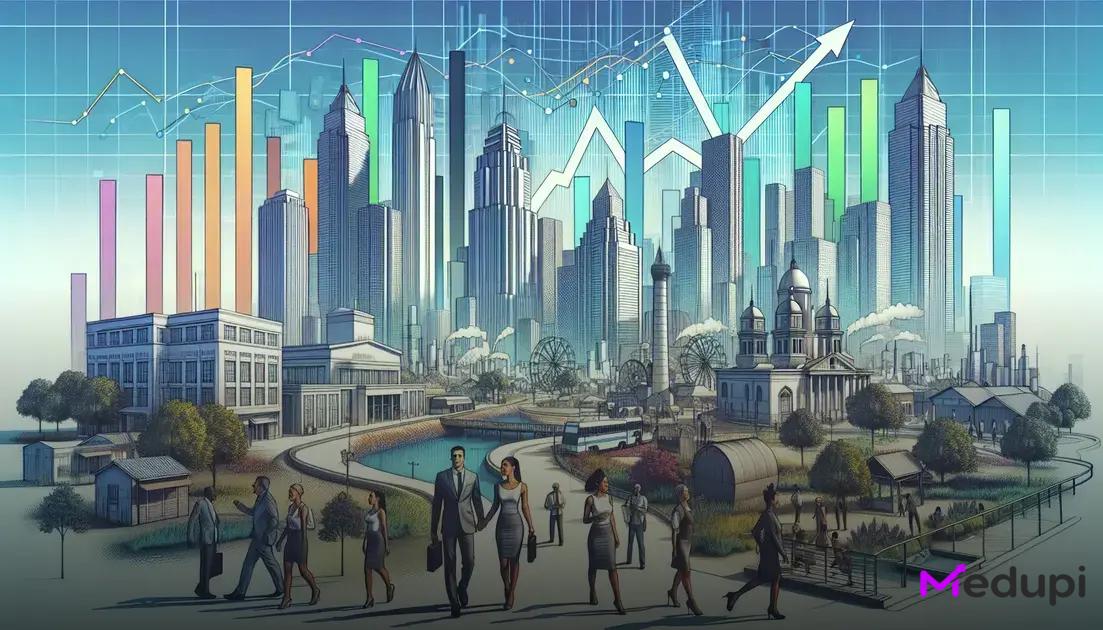ADVERTISEMENT
Economic growth is a critical driver of prosperity and development worldwide. Understanding the factors that influence economic growth can help policymakers, businesses, and individuals take informed actions. From innovation and government policies to global trade and investment in human capital, these elements play an essential role in shaping the economic landscape.
The role of innovation in economic growth
The role of innovation in economic growth can hardly be overstated. Innovation propels economies by fostering new technologies and methodologies, significantly enhancing productivity. This, in turn, leads to more efficient production processes and the creation of new industries.
ADVERTISEMENT
Technological Advancements are direct outcomes of the innovation we see today, from smartphones to renewable energy solutions. These advancements often lead to the generation of high-quality jobs, boosting the economy by raising income levels and improving the standard of living.
Another key aspect is R&D investments. Companies and governments investing in research and development can achieve technological breakthroughs that provide a competitive edge on a global scale. This can lead to improved market positions and the ability to export groundbreaking technologies, further driving economic growth. One cannot overlook the importance of entrepreneurship in this context. New startups often bring disruptive technologies to market, pushing established companies to innovate and improve their offerings.
ADVERTISEMENT
Moreover, innovation facilitates better sustainable practices. With the global focus shifting towards sustainability, innovative solutions in energy, waste management, and resource utilization act as crucial drivers of environmentally friendly economic development. This not only safeguards the planet but also opens up new business opportunities and markets.
It’s also worth noting that innovation doesn’t thrive in a vacuum. It requires a conducive ecosystem comprising favorable policies, skilled human capital, and adequate funding. When these elements align, they create an environment where innovation can thrive, ultimately propelling economic growth to new heights.
Government policies and their impact on growth

Government policies significantly influence economic growth. Policymakers can affect growth both positively and negatively through various strategies and regulations. One of the key ways is through taxation policies. Lower taxes can stimulate investment and consumer spending, leading to increased economic activity. Conversely, higher taxes may slow down spending and investment, potentially hindering growth.
Another crucial area is monetary policy. By adjusting interest rates, governments can control inflation and manage economic stability. Lower interest rates usually encourage borrowing and investing, which can spur growth. On the other hand, higher interest rates can help control inflation but may also slow down economic activities.
Regulatory policies also play a vital role. Simplifying regulations can reduce costs for businesses and foster a more conducive environment for innovation and expansion. However, too much deregulation can lead to market failures and systemic risks.
Trade policies are another critical factor. Free trade agreements and policies that promote exports can help boost economic growth by expanding market access. Protectionist policies, while aimed at safeguarding local jobs, may lead to trade wars and reduced economic efficiency.
Lastly, fiscal policies like government spending on infrastructure, education, and healthcare can have long-term positive effects on growth. Well-planned spending can set the foundation for sustainable economic expansion by improving productivity and the quality of life.
Global trade and economic development
Global trade plays a crucial role in economic development. By facilitating the exchange of goods, services, and technologies across borders, it allows countries to specialize in the production of goods where they have a comparative advantage. This specialization boosts efficiency and productivity, leading to higher output and income levels.
Moreover, participation in global trade opens up access to wider markets, providing opportunities for businesses to expand and increase their revenues. It also encourages foreign direct investment (FDI), which brings not only capital but also advanced technologies and management practices to the host countries.
Developing nations benefit particularly from global trade as it can lead to economic diversification and reduce reliance on a narrow range of domestic industries. For these countries, trade is a conduit for transferring knowledge and fostering innovation. Additionally, it can help to stabilize economies by providing multiple sources of income and reducing vulnerability to domestic economic shocks.
Trade agreements and international economic collaborations play a significant role in reducing trade barriers and promoting economic growth. These agreements can harmonize standards, lower tariffs, and create more predictable trading environments, which are vital for businesses planning long-term investments.
However, the benefits of global trade are not automatically inclusive. Strategic policies are required to ensure that economic gains are broadly shared. Addressing issues such as labor rights, environmental standards, and fair trade practices is paramount for sustainable development.
The significance of human capital

Human capital plays a pivotal role in driving economic growth. It refers to the skills, knowledge, and experience possessed by individuals. A well-educated and skilled workforce is essential for fostering innovation and enhancing productivity in various sectors.
Investing in education and training increases the efficiency and effectiveness of the labor force. This leads to higher levels of productivity and, consequently, economic prosperity. Moreover, it encourages entrepreneurial activities, which are crucial for job creation and economic diversification.
Health is another critical aspect of human capital. A healthy population is more productive and contributes significantly to economic development. Investments in healthcare services not only improve individual well-being but also reduce economic burdens caused by illnesses and absenteeism.
It’s essential for governments to implement policies that promote human capital development. This includes funding for education, providing vocational training, and ensuring accessible healthcare services. Such measures create a robust and adaptable workforce capable of meeting the demands of a dynamic global economy.
Human Capital and Technological Advancements
Technological advancements further amplify the importance of human capital. As economies digitise, the demand for tech-savvy professionals increases. Continuous learning and upskilling become imperative to keep pace with technological innovations and maintain economic competitiveness.
Challenges and future outlook
Economic growth today faces various challenges, such as income inequality, political instability, and environmental sustainability issues. These factors hinder global prosperity. Policymakers must address these concerns head-on to ensure sustained growth.
One major challenge is the balancing act between economic advancement and environmental preservation. Nations strive to grow their economies, but often at the expense of natural resources. Sustainable practices must be integrated into development strategies to protect the planet for future generations.
The rising income inequality is also a pressing challenge. As economies grow, the wealth disparity between the rich and poor tends to widen. This inequality can lead to social unrest and hinder overall economic progress. Economic policies should aim to promote inclusive growth, ensuring that the benefits of prosperity reach all segments of society.
On the future outlook, technology and innovation continue to be critical drivers of economic growth. The rise of digital economies and advancements in artificial intelligence and automation present new opportunities. These technologies enhance efficiency, productivity, and create new markets. However, they also pose challenges, such as job displacement. Societies must adapt to these changes through education and reskilling programs to prepare the workforce for future demands.
Lastly, the impact of global trade on economic development cannot be ignored. While trade promotes growth by opening new markets and encouraging competition, it also exposes economies to global risks and uncertainties. In the future, economic policies should focus on creating resilient economies capable of withstanding global disruptions while maximising the benefits of trade.





